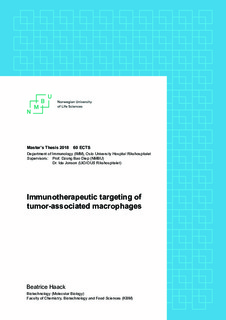| dc.description.abstract | The development of CAR T cell technology allows for MHC-independent recognition of a native target antigen by T cells. In august 2017, the first CD19-specific CAR T cell therapy was approved in the U.S. for the treatment of B-lymphoid malignancies. However, the translation into solid tumors has proven more challenging. Main obstacles include a paucity of appropriate tumor-specific antigens, and difficulties in facilitating CAR T cell migration to the tumor site and survival in the hostile microenvironment of the tumor.
Based on previous work from our group showing that re-polarization of tumor-associated macrophages (TAMs) by CD4+ T cells can induce tumor regression, we hypothesized that CAR T cell targeting of TAM-specific antigens would lead to TAM re-polarization towards the tumoricidal phenotype with subsequent elimination of cancer cells. Given the abundance of
macrophages in most solid tumors, this identifies a novel approach to cancer immunotherapy.
In this study, we engineered a CAR construct specific for folate receptor beta (FRβ), a protein reported to be overexpressed that is overexpressed on TAMs, and investigated the use of FRβ-specific CAR T cells on TAMs in vitro and in vivo in established solid tumors. We found that CAR T binding activates and re-polarizes TAMs towards the pro-inflammatory and anti-tumor M1 phenotype, which are able to kill tumor cells in vitro. Re-educated TAMs secreted significantly higher amounts of pro-inflammatory cytokines and NO, and inhibition of iNOS activity completely abrogated macrophage-mediated killing, indicating that the anti-tumor effect triggered by FRβ-specific CAR T cells is dependent on iNOS activity in vitro. To fully assess the therapeutic potential of these CAR T cells, adoptive cell transfer experiments were performed in immunocompetent mouse tumor models. TAM-directed CAR T cell therapy slowed down tumor growth and led to regression of large, established tumors in models of melanoma and colon cancer and induced long-term remission in a subset of the treated animals.
Our findings highlight a novel approach to CAR T cell immunotherapy for solid tumors which is independent on the expression or secretion of tumor-specific antigens by the tumor cells, and which actively counteracts local immunosuppression at the tumor site. | nb_NO |

